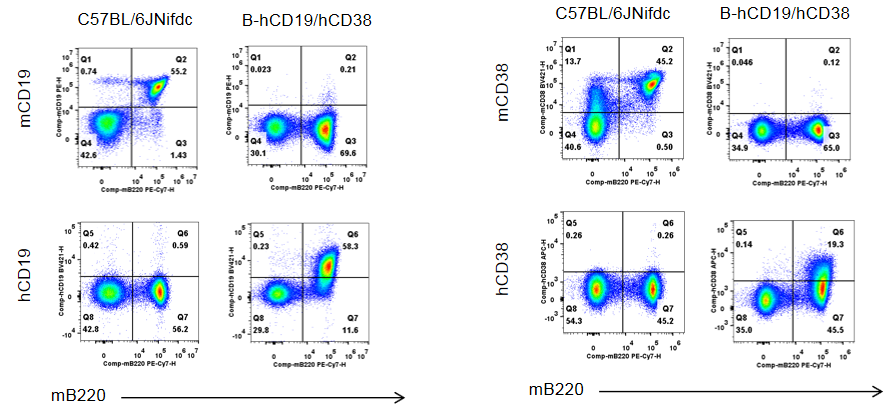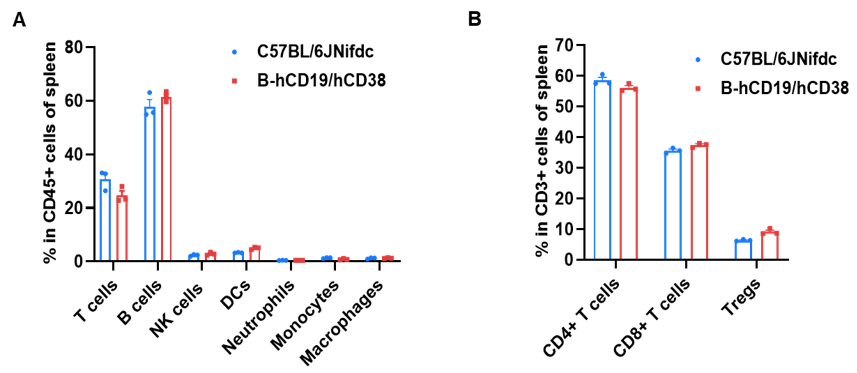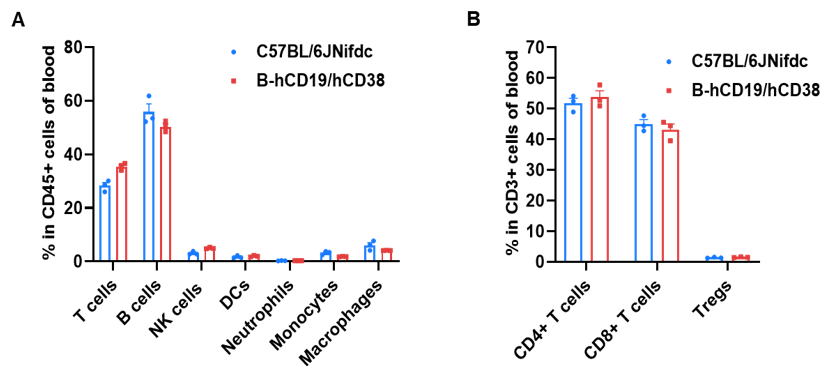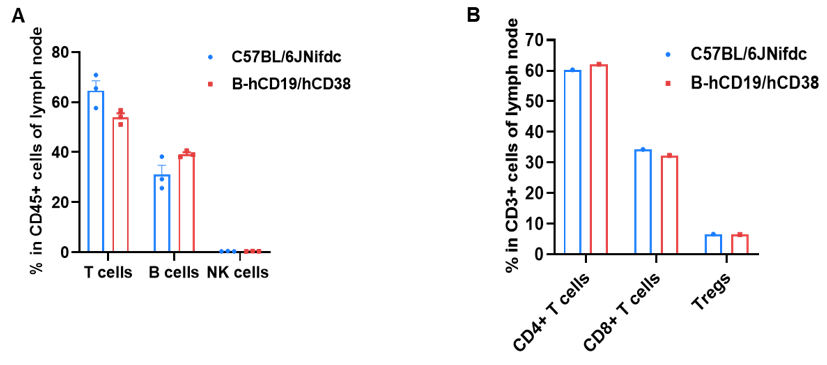B-hCD19/hCD38 mice
| Strain Name |
C57BL/6-Cd19tm4(CD19)Bcgen Cd38tm3(CD38)Bcgen/Bcgen
|
Common Name | B-hCD19/hCD38 mice |
| Background | C57BL/6 | Catalog number | 113597 |
|
Related Genes |
B4, CVID3; ADPRC 1, ADPRC1, cADPR1; |
||
|
NCBI Gene ID |
12478, 12494 | ||
Description
Targeting strategy
Protein expression analysis in spleen
Frequency of leukocyte subpopulations in spleen
Frequency of leukocyte subpopulations in blood
Frequency of leukocyte subpopulations in lymph nodes
- CD19 is specifically expressed in normal B cells, tumor B cells, and follicular dendritic cells. CD19 plays a crucial role in the development of B cells. CD38 is widely expressed in hematopoietic and non hematopoietic cells and is an important marker of B cells. It is a potential target for multiple myeloma and autoimmune diseases.
- The chimeric human CD19 coding sequences were inserted into mouse Cd19 gene in B-hCD19/hCD38 mice. The human CD38 coding sequences encoding the extracellular domain were inserted into mouse Cd38 gene in B-hCD19/hCD38 mice.
- Human CD19 and CD38 were exclusively detectable on B cells from spleen of homozygous B-hCD19/hCD38 mice, but not in wild-type C57BL/6JNifdc mice. Humanization of CD19 and CD38 do not change the overall frequency or distribution of immune cell types in spleen, blood and lymph nodes.
- This product is used to evaluate the pharmacodynamics and safety of CD19/CD38 bispecific antibodies in B cell lymphoma and autoimmune diseases.
Gene targeting strategy for B-hCD19/hCD38 mice. The CD19 chimeric coding sequences of human CD19 extracellular domain, mouse Cd19 transmembrane and cytoplasmic domain were inserted to replace part of murine exon 2 in B-hCD19/hCD38 mice. The coding sequences of human CD38 encoding the extracellular domain were inserted following partial exon 2 of mouse Cd38 in B-hCD19/hCD38 mice.

Strain specific CD19 and CD38 expression analysis in wild-type C57BL/6JNifdc mice and homozygous humanized B-hCD19/hCD38 mice by flow cytometry. Splenocytes were collected from wild-type C57BL/6JNifdc mice and homozygous B-hCD19/hCD38 mice. Protein expression was analyzed with anti-mouse CD19 antibody (Biolegend, 115507), anti-mouse CD38 antibody (Biolegend, 102732), anti-human CD19 antibody (Biolegend, 302234) and anti-human CD38 antibody (Biolegend, 356606) by flow cytometry. Mouse CD19 and CD38 were only detectable in wild-type C57BL/6JNifdc mice. Human CD19 and CD38 were exclusively detectable in homozygous B-hCD19/hCD38 mice, but not in wild-type C57BL/6JNifdc mice.

Frequency of leukocyte subpopulations in spleen by flow cytometry. Splenocytes were isolated from wild-type C57BL/6JNifdc mice and homozygous B-hCD19/hCD38 mice (female, 6-week-old, n=3). A. Flow cytometry analysis of the splenocytes was performed to assess the frequency of leukocyte subpopulations. B. Frequencies of T cell subpopulations. Percentages of T cells, B cells, NK cells, DCs, monocytes, macrophages, neutrophils, CD4+ T cells, CD8+ T cells and Tregs in B-hCD19/hCD38 mice were similar to those in C57BL/6JNifdc mice, demonstrating that humanization of CD19 and CD38 do not change the frequency or distribution of these cell types in spleen. Values are expressed as mean ± SEM.

Frequency of leukocyte subpopulations in blood by flow cytometry. Blood cells were isolated from wild-type C57BL/6JNifdc mice and homozygous B-hCD19/hCD38 mice (female, 6-week-old, n=3). A. Flow cytometry analysis of the blood cells was performed to assess the frequency of leukocyte subpopulations. B. Frequencies of T cell subpopulations. Percentages of T cells, B cells, NK cells, DCs, monocytes, macrophages, neutrophils, CD4+ T cells, CD8+ T cells and Tregs in B-hCD19/hCD38 mice were similar to those in C57BL/6JNifdc mice, demonstrating that humanization of CD19/hCD38 does not change the frequency or distribution of these cell types in blood. Values are expressed as mean ± SEM.

Frequency of leukocyte subpopulations in lymph nodes by flow cytometry. Lymph nodes were isolated from wild-type C57BL/6JNifdc mice and homozygous B-hCD19/hCD38 mice (female, 6-week-old, n=3). A. Flow cytometry analysis of the leukocytes was performed to assess the frequency of leukocyte subpopulations. B. Frequencies of T cell subpopulations. Percentages of T cells, B cells, NK cells, CD4+ T cells, CD8+ T cells and Tregs in B-hCD19/hCD38 mice were similar to those in C57BL/6JNifdc mice, demonstrating that humanization of CD19/hCD38 does not change the frequency or distribution of these cell types in lymph nodes. Values are expressed as mean ± SEM.












 京公网安备:
京公网安备: